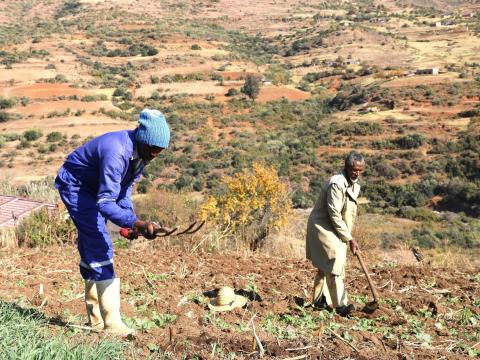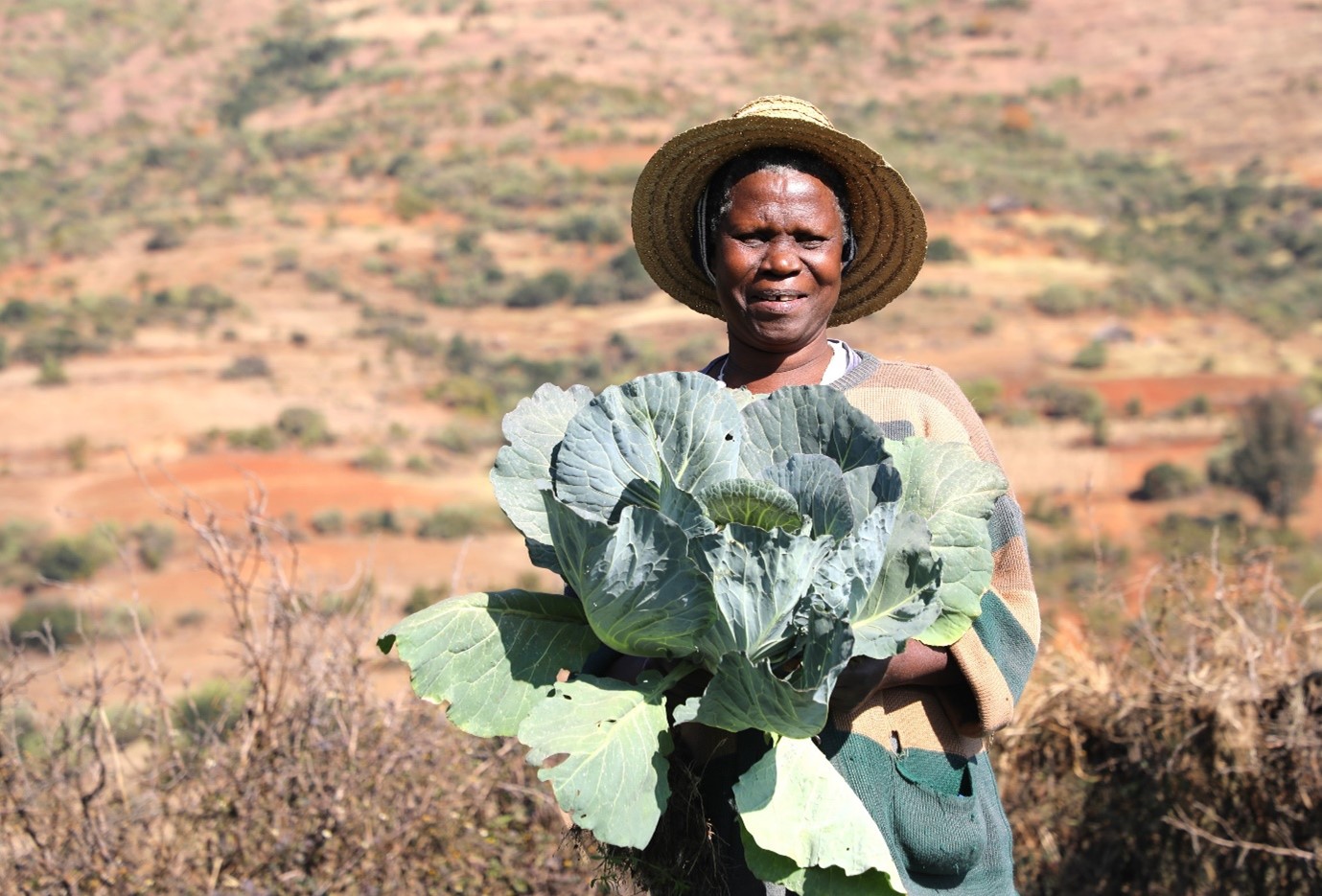Droughts Bitter Harvest: How Climate Change threatened the Nalane Family’s Agricultural Lifeline

By: Lerato Brown, Communications and Marketing Manager, Lesotho
Hantsi Nalane, 61, wiped his weathered hands on his trousers as he surveyed the small household vegetable garden that had been his family's lifeline for years. His wife ‘Malipuo, also 61, stood beside him, her eyes reflecting the same mixture of pride and worry. Their 26-year-old son, Ts’oanelo, joined them, his youthful energy tempered by the weight of their shared struggles.
The Nalane family had always been proud of their little plot, where they grew cabbage, tomatoes, garlic, onions, spinach, beetroot, and carrots. But lately, their harvests had become increasingly unpredictable. "The vegetables are drying out before we can harvest them," ‘Malipuo said, her voice touched with frustration. "With the rains becoming less and less frequent, sometimes we get nothing at all."
The vegetables are drying out before we can harvest them. With the rains becoming less and less frequent, sometimes we get nothing at all. - 'Malipuo
Hantsi nodded grimly. "We used to sell some of our produce to our neighbours. Now, we barely have enough for ourselves. When you are worried you don't have enough, sharing with others becomes a last thought." The family's concerns went beyond their own table. They knew their struggles affected the entire community that relied on their produce. Days without fresh vegetables have become more common, and the Nalane’s felt the weight of their neighbours’ hunger as keenly as their own.
But the ripple effects of their failing crops reached even further. With less produce to sell, their income had decreased. Hantsi's weathered face creased with worry as he spoke, "Without that money, we struggle to pay for our children's education. There were times when we couldn't afford school fees or books." ‘Malipuo nodded, adding softly, "Buying new clothes became a luxury we couldn't afford. We mended and patched as best we could, but it wasn't always enough."
The lack of funds hit hardest when it came to healthcare. Ts’oanelo's eyes darkened as he recalled, "Last year, when my younger sister fell ill, we had to borrow money for her treatment. The stress of that debt weighed on us all." These financial strains created a constant undercurrent of anxiety in the household. The Nalane’s found themselves caught in a cycle of poverty that seemed impossible to break. Every failed crop pushed their dreams of a better life further out of reach, threatening to keep their children trapped in the same struggle they had known all their lives.
When World Vision Lesotho arrived with their vegetable production initiative, the Nalane’s saw it as more than just a way to improve their garden. It was a lifeline, a chance to provide for their family's most basic needs. World Vision provided shade nets, and vegetable seeds, a simple yet revolutionary addition to their garden.
"They trained us on how to use the shade nets," Ts’oanelo explained, his eyes brightening with enthusiasm. "We learned how they protect our crops from harsh weather, insects, and diseases. Even birds can't get to them!" The family also received training on plot creation, separating their vegetables for optimal growth. But the true test came unexpectedly.
We learned how they protect our crops from harsh weather, insects, and diseases. - T'soanelo
"Recently, snow fell," Ts’oanelo recounted. "Our crops in the shade nets were untouched, but everything outside was destroyed." The snow had packed heavily on the shade net, nearly causing it to collapse. But the family, remembering their training, quickly rallied to remove the snow and support the structure. "It reminded us of our responsibility to protect this valuable resource," Hantsi said proudly.
World Vision's intervention went beyond the garden. They provided water to the community, making it easier for the Nalane’s to keep their garden nourished. The combination of reliable water and protected crops transformed their food situation dramatically.

‘Malipuo's eyes sparkled as she spoke about their newfound abundance. "We now have sufficient food for ourselves, and we're back to selling to the community. We can even give to those in need again." The family had also learned about nutrition, focusing on crops with high nutritional value. "We plant spinach for iron," Malipuo explained, "and we are always looking for ways to improve our family's health through what we grow."
We now have sufficient food for ourselves, and we're back to selling to the community. We can even give to those in need again. - 'Malipuo
As they looked to the future, the Nalanes' ambitions had grown along with their garden. Hantsi outlined their plans: "We want to expand our production under the shade nets, add new vegetables like green peppers, and sell our produce beyond just our community. Maybe even at the district level!" Ts’oanelo chimed in, "And we are planning to grow crops like onions and beetroot outside the nets since they are more resistant to harsh weather conditions"
The family also dreamed of purchasing additional shade nets, ensuring all their crops would be protected. But their aspirations went beyond just their own success. "We want to be able to give more to those less fortunate," ‘Malipuo said softly. "World Vision met us halfway, and now we see our efforts prospering. It's our turn to help others thrive too."
As the sun sets over Ha- Majara village in Mpharane Area Programme in Leribe, Lesotho, the Nalane's stands as evidence to the profound impact of climate change on vulnerable communities. Across Lesotho and beyond, countless families face similar struggles as unpredictable weather patterns threaten their survival. The Nalane’s journey shows how erratic climate affects not just crops, but every aspect of family life.
Yet their triumph proves that with proper support, families can adapt and thrive. World Vision’s interventions protected more than just vegetables, they shielded a family from poverty and food insecurity. Now more than ever we see the need for climate resilient agriculture and how small interventions can yield transformative results, urging immediate action to support vulnerable communities on climate change’s frontlines in order to cultivate a more hopeful future for all.